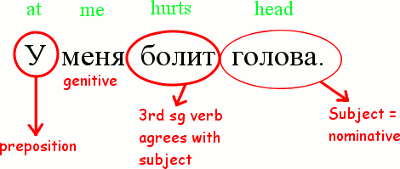Болеть (hurt, ache)
Russian has a verb болеть which means “to hurt, ache,” and another verb болеть which means “to be ill.” That's right: their infinitives are spelled exactly the same, although they are conjugated differently. Today we will discuss the former.
The first thing to notice about the verb “to hurt, ache” is that it is only used in the third person, never in the first or second:
| to hurt, ache | ||
| Imperfective | Perfective | |
| Infinitive | болеть | заболеть |
| Past | болел болела болело болели |
заболел заболела заболело заболели |
| Present | - - болит - - болят |
No such thing as perfective present in Russian. |
| Future |
буду болеть будешь болеть будет болеть будем болеть будете болеть будут болеть |
- - заболит - - заболят |
| Imperative | Not used | |
In English we say, “My head hurts.” The Russians phrase it as “at me hurts the head”:

There are а couple things to note here. First of all, the person experiencing the pain shows up in the genitive case as the object of the preposition у. The body part that hurts shows up in the nominative case. Since the body part is the subject, the verb has to agree with it, not with the person who is suffering. If more than one thing hurts, the verb goes in the plural. Thus:
| У Виктора болит голова. | Victor's head hurts. |
| У Виктора болела голова. | Victor's head hurt. |
| У Виктора болят ноги. | Victor's legs hurt. present |
| У Виктора болели ноги. | Victor's legs hurt. past |
The prefix за- often adds the idea of “start to” to a verb, and the perfective заболеть is not an exception. Here are some examples.
| Через час после прививки у Вани заболела рука. | An hour after the vaccination Johnny's arm began to hurt. |
| Не пей воду из-под крана, а то у тебя заболит живот. | Don't drink tap water, or you will get a stomach ache. |
| — Блин, почему у меня всегда болят ноги? | “Dang, why do my feet always hurt?” |
| — Это потому, что ты всегда носишь модные туфли, которые вредят ногам. Тебе надо воспользоваться здравым смыслом и подобрать лучшую обувь. | “That's because you always wear fashionable shoes that damage your feet. You need to use common sense and buy better footware.” |
| — Что ты! Здравый смысл — это скучно. Ты знаешь, что всегда предпочитаю моду здравому смыслу. | “Oh, come on. Common sense is boring. You know that I always prefer style to common sense.” |
| — Да, это с твоей стороны нравственный недостаток. | “Yes, that's a moral defect on your part.” |
3 comments
But you you also can say: “Моя голова болит", “Моя рука болит".
Form is loading...